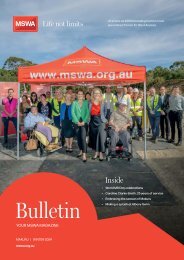MSWA Bulletin Magazine Spring 2022
Celebrating 50 years of MSWA | Our commitment to research | New technology taking the pressure off | Water, life, the universe and everything!
Celebrating 50 years of MSWA | Our commitment to research | New technology taking the pressure off | Water, life, the universe and everything!
Create successful ePaper yourself
Turn your PDF publications into a flip-book with our unique Google optimized e-Paper software.
CUSTOMER ENGAGEMENT TEAM<br />
THE NDIS<br />
PRICE GUIDE<br />
AND YOU<br />
The National Disability<br />
This helps the NDIA to control<br />
Despite this rise, the NDIA has<br />
While <strong>MSWA</strong> will abide by this<br />
Insurance Agency (NDIA)<br />
recently released its NDIS<br />
Pricing Arrangements and<br />
Price Limits for the <strong>2022</strong> – 2023<br />
financial year and, like so many<br />
things, there are some wins<br />
but also questions on how the<br />
new price limit will impact<br />
us over this period. We will<br />
try to highlight some of the<br />
key points below and what it<br />
means for you.<br />
But first, some background. The<br />
NDIA sets price limits for disability<br />
services received by participants.<br />
These prices are outlined in the<br />
‘NDIS Pricing Arrangements’ and<br />
are released annually or when the<br />
situation dictates (for example the<br />
COVID-19 response).<br />
a market still in its infancy,<br />
supporting provider growth until<br />
the disability provider marketplace<br />
is established. So, what does this<br />
year’s release mean for you?<br />
The most significant change was a<br />
nine per cent price increase across<br />
a range of services, including<br />
personal care and social support,<br />
which took effect on 1 July <strong>2022</strong>.<br />
The good news is that participants’<br />
plans will be automatically<br />
increased to account for these price<br />
limit changes, which means your<br />
funding won’t be impacted.<br />
This increase is designed to<br />
alleviate pressures providers<br />
are facing in supporting their<br />
workforce, in addition to covering<br />
compliance and pandemic<br />
preparations costs. It should<br />
be seen as a positive step in<br />
maintaining a capable workforce.<br />
decided not to increase the prices<br />
for most Allied Health and Support<br />
Coordination services. While<br />
the price update does suggest a<br />
‘further review’ into these costs, the<br />
NDIA was clear in its determination<br />
that no change will be approved.<br />
While this means your plan will<br />
be unaffected, this decision will<br />
impact providers’ ability to attract<br />
and retain their allied health<br />
workforce. The exception to this<br />
was Nursing Support which will<br />
be indexed by 2.94 per cent in line<br />
with the Wage Price Index and<br />
Consumer Price Index.<br />
Another significant change was<br />
the NDIA’s definition of ‘short<br />
notice’ cancellation. This was<br />
previously two days for shorter<br />
support services, up to five full<br />
days for others. This has now been<br />
set at a seven-day notice period<br />
requirement. On this point, it is<br />
change, we do understand that<br />
at times a participant’s condition<br />
may impact their ability to provide<br />
sufficient notice. We have, and<br />
will continue to review these<br />
occurrences as and when<br />
they arise.<br />
Finally, the NDIS has sought<br />
to simplify the High-Intensity<br />
Support framework. This includes<br />
clarification of High-Intensity<br />
Support as services provided to<br />
a person who has support needs<br />
that require the skills described<br />
by the NDIS Commission as ‘High-<br />
Intensity Daily Personal Activities’.<br />
Overall, the latest price guide<br />
should not have a significant<br />
impact on your plan. Please keep<br />
in mind these guides are subject to<br />
change. If you have any questions,<br />
please reach out to your Client<br />
Liaison Coordinator for support.<br />
Other changes in the <strong>2022</strong> – 2023 NDIA Price Guide include:<br />
/ Providers are now able to charge a Client for return travel when<br />
a cost has been incurred during a Core Support service. This<br />
brings core supports in line with existing rules for capacitybuilding<br />
supports.<br />
/ Capacity building and training in Self-Management and Plan<br />
Management is now a Core Support. This means you have more<br />
flexibility in how you use these line items.<br />
/ Locations which are not currently classified as ‘remote’ or ‘very<br />
remote’, but where it is not possible to travel from the location<br />
to another major city without crossing a remote area, are now<br />
classified as ‘remote’ for planning purposes. This shouldn’t<br />
impact us in WA as the NDIS believes we are all ‘remote’.<br />
/ The Temporary Transformation Payment<br />
(TTP) has been reduced from 4.5 per cent<br />
to three per cent. <strong>MSWA</strong> has decided<br />
not to charge this cost to our Clients.<br />
important to recognise that a lack<br />
of sufficient notice is a concern for<br />
service providers and their ability to<br />
GEOFF HUTCHINSON<br />
MANAGER CUSTOMER<br />
ENGAGEMENT<br />
fill the service spot.<br />
8<br />
9

















